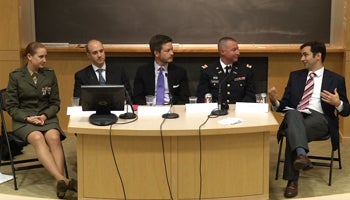Law students interested in a law firm career can attend firm-sponsored meet-and-greets to speak with associates. Students interested in public interest careers can meet one-on-one with visiting alumni advisors. But HLS students interested in military careers have fewer chances to mingle with those who have pursued that path. To provide that opportunity, OPIA welcomed to HLS five alumni who have served in the armed forces, to provide guidance and answer student questions.
The Careers in the Military panel, which took place on Nov. 8, was moderated by John Doyle ’12 of the HLS Armed Forces Association. Panelists discussed their motivations for joining the military, how those reasons were borne out during their service, and whether their reasons for staying in the military align with those initial beliefs.
For Marc Lindemann ’01, timing played a big role in his decision. Currently senior assistant D.A. in the Suffolk County District Attorney’s Office and battery commander for the Army National Guard, and former platoon leader in the U.S. Army, Lindemann began working for Sullivan & Cromwell on Sept 10, 2001. He spent the 11th assisting in triage in Chelsea Piers and realized that if he was going to join the military, the time was now.
“When I was an undergraduate, I had many debates about the nature of military service and what it means to be a member of society, and whether citizens have an obligation to defend that society and that society’s values. I came down pretty hard on that idea and realized that at some point I had to put my money where my mouth was, so I joined up,” he said.
Lindemann and other panelists advised students who are interested in military careers to remember that they can always convince themselves that the timing isn’t right, but doing so would be to deprive themselves of a meaningful professional and personal experience.
“If you have any inclination at all to serve, you might as well. Worst-case scenario is that you look back at it the rest of your life and say, ‘I served. I hated it, but I served,’” said Michael Bahar ’02, U.S. Navy JAG Corps, and currently on detail as deputy legal adviser to the National Security Staff, at the White House. But military service provides a tremendous breadth of opportunity very quickly, he added, and his career has been challenging, rewarding and, most of all, fun.
Andru Wahl LL.M.’10, currently at Alston & Bird and a former member of the Navy JAG Corps, emphasized that the motivation for joining the Armed Forces can go beyond the desire to serve one’s country. He told students that he recently found a pro/con chart he had made when deciding whether to apply for the Navy JAG Corps while he was studying for the bar exam, and was reassured to see that his objectives for joining had all been met—the desire to serve his country of course, but also to travel the world, learn international law, and live overseas.
Lindsay Rodman ’07, judge advocate in the U.S. Marine Corps, explained the different titles and roles that lawyers have in the Army, Navy and Marines. In the Marines, for example, there is no JAG corps, so Judge Advocates like Rodman are considered line officers and are completely on par with all other line officers. The distinction is important for students deciding between service in different branches of the military, because the recruitment process is different. Notably, Officer Candidate School, more commonly known as “boot camp,” and infantry training is required in order to join the Marines. Although more physically demanding than what is required of other legal careers in the military, Rodman emphasized the sense of camaraderie it builds and the exposure to many different kinds of law she has gained. And, like her co-panelists, she said that military service is fun.
“Most Marines that stay in say, ‘When it’s not fun, it’s funny.’ If you have that perspective, you’ll have a great time.”
